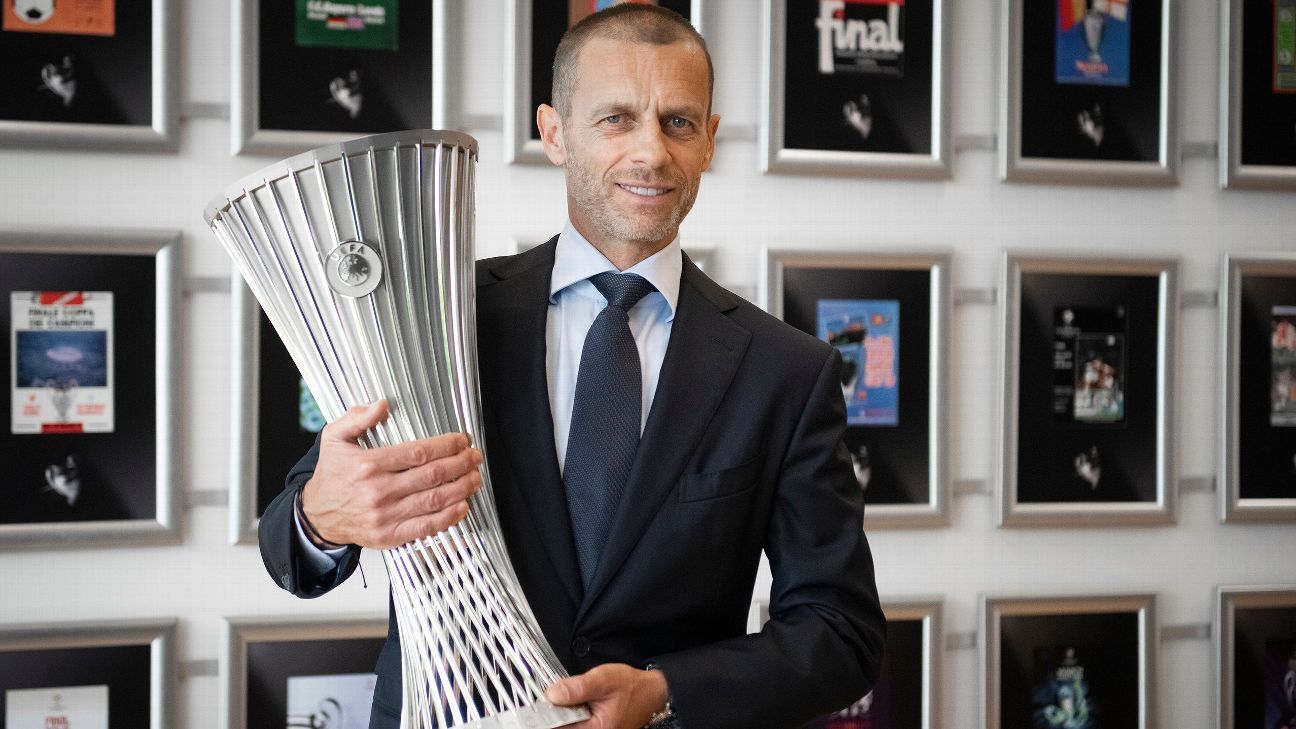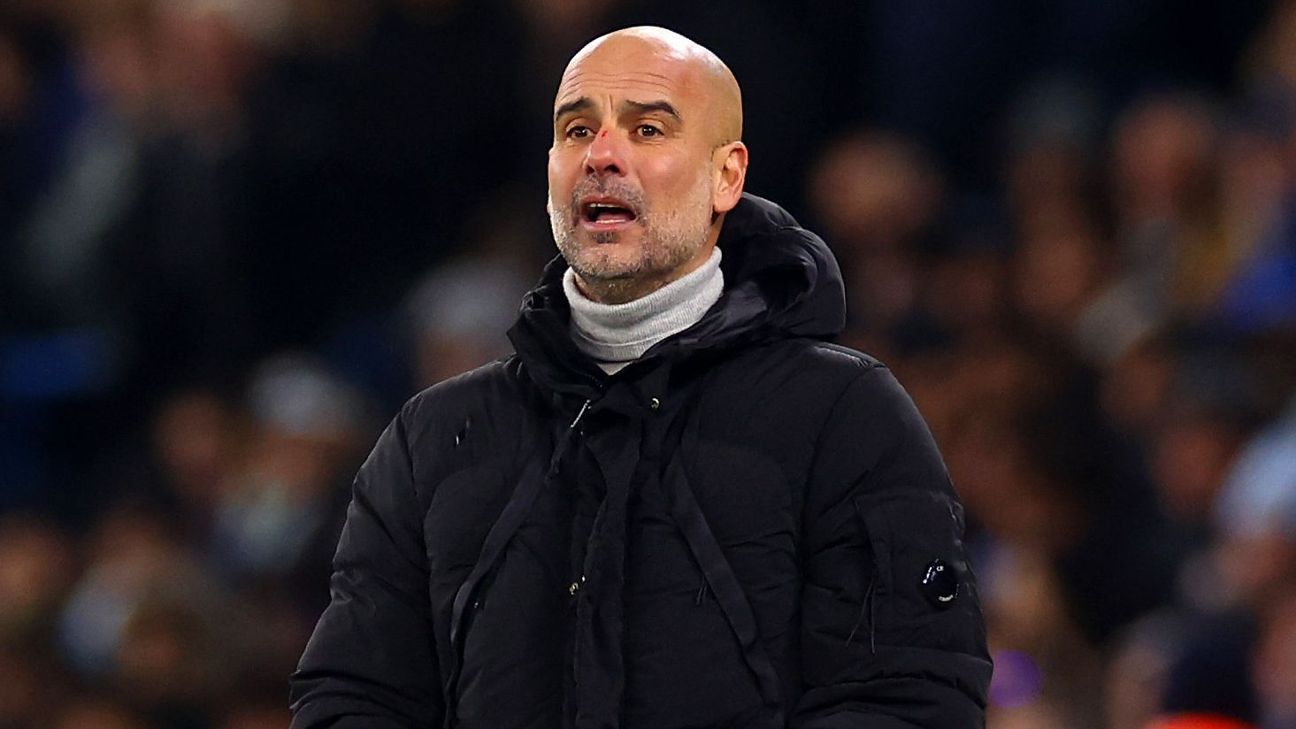
UEFA's brand-new club competition, the Europa Conference League, became a lot more real in the eyes of fans ahead of its launch next season when the trophy itself was unveiled this week.
Primed to begin in 2021-22, the Conference League will serve as UEFA's tertiary continental competition, alongside the Champions League and the Europa League.
Tottenham Hotspur, AS Roma, Union Berlin, Anderlecht, and Stade Rennais will be among the 32 clubs who will feature in the group stage, with the competition primarily populated by teams that finished outside the Champions League and Europa League spots in their respective domestic leagues, plus selected cup winners from lower-ranked European leagues.
The new Europa Conference League trophy that Spurs and their ilk will be competing to has also been revealed, with UEFA proudly debuting their latest silverware this week. Standing a sliver under 60 centimetres (2 feet) tall and weighing 11 kilograms (24 pounds), the trophy consists of 32 hexagonal spines -- one for each team in the group stage -- which twist and curve upwards from the base.
According to UEFA, the spiralling shape of the spines was inspired by "the flight of a football as it heads toward the goal," which they add is "the ultimate moment of optimism" for any fan. We can take or leave the tenuous PR guff, but the Conference League trophy is nice enough in a fairly bland, inoffensive kind of way.
Here's how it stacks up against the rest of the silverware that European club sides will be competing to lift next season.
- UEFA Europa Conference League: All you need to know
- ESPN Soccer Champions pick 'em: Compete for $4,000 of Amazon.com gift cards
20. Trophee des Champions
Spoiler alert: super cups -- generally a one-off showpiece between the previous season's league champions and cup winners -- do not fare that well here. The French version is a large, fluted, boxy trophy that bears a strong resemblance to the Europa League trophy without having any of the subtle flourishes that adorn UEFA's second-string silverware.
19. Supercoppa Italiana
Played annually between the previous season's winners of the Serie A and the Coppa Italia, the Supercoppa looks like a stately piece of antique silverware despite only dating from 1988. It's okay, but all that famous Italian style is missing and it really doesn't radiate much in the way of flair.
18. DFL-Supercup
The German super cup trophy consists of a football held aloft by two intertwining arms -- a silver one that represents the Bundesliga championship, and a gold one to represent the DFB-Pokal. It's another trophy on the generic side, but the symbolism is a nice touch.
17. Coppa Italia
The Italian Cup has been through many changes since it was first contested in 1922, with the current incarnation resembling a large, chunky, gold-tinted goblet, studded with the colours of the Italian flag. In all honesty, it looks like something your players might pick up in a cut scene at the end of a successful Pro Evolution Soccer master league campaign.
16. Europa Conference League
⚽ ??? ???? ??? ??? ???? ?????? ?????????? ?????? ?????
? 184 teams
? 55 member associations represented
? 46 clubs transferring from either the #UCL or #UEL.?️ First final: 25 May 2022 in Tirana, Albania.
— UEFA (@UEFA) May 24, 2021
It's hard to avoid the parallels between the Conference League being a cut-price version of the Europa League when the trophy looks like a cut-price version itself. It may be hexagonal rather than octagonal, but the basic design is very similar and it doesn't help that it's just a little bit smaller, a little bit lighter, a little bit plainer, and all together just a little bit less impressive all around.
15. Supercopa de Espana
One of several Spanish trophies created by the famed Federico Alegre jewellers of Madrid, the Spanish Supercopa is a squat yet ornate trophy that always bears the club crests of the four sides competing in that year's midseason mini-tournament upon its wooden pedestal. Unlike many competitions, the winners of the Supercopa are allowed to take possession of the cup as soon as they win it and even take it home with them on the night should they wish.
14. Serie A
The Serie A trophy is a tall, funnel-shaped piece of metalwork that resembles the kind of gaudy uplighter lamp you might find in the lobby of cruise ship. It's a common misconception that the trophy is nicknamed the "Scudetto" ("Little Shield"), which is actually a reference to the small shield-shaped badge that title-winning clubs have worn on their shirts since the early 1920s.
13. European Super Cup
The original European Super Cup (circa 1972) certainly lived up to its billing by being genuinely enormous with huge circular handles. Since then, the silverware decreased dramatically in size before being given a sleek and modern makeover, featuring a silver chalice cupped by a marble base plate bearing the UEFA marque. Having shrunk down to just 40cm and 5kg in its previous incarnation (the smallest and lightest of all UEFA trophies at the time), the design was retained but the size increased in 2006, whereby the trophy swelled to a brawny 58cm and 12kg, in-keeping with the increased prestige afforded to the game.
12. Community Shield
On the large side and therefore slightly unwieldly once hoisted above the head, the Community Shield is traditionally the first piece of silverware on offer for English teams every year, when the reigning league champions take on the holders of the FA Cup on the Sunday before the next season begins. However, Jose Mourinho is the pretty much the only manager to seriously count it among his trophy haul come the end of the season. The trophy has undergone several re-casts since 1908-09 but the basic design remains the same, with the current shield measuring almost 60 centimetres in diameter and taking roughly 130 man hours to hand-craft.
11. League Cup
Aston Villa lifted the inaugural League Cup trophy in 1961 and more than 50 years later that same piece of silverware is still in use. There have been periods when the trophy was replaced (e.g. several competition sponsors chose to award their own trophy during the 1980s) but the original 25cm tall, three-handled Georgian urn design was reinstated shortly thereafter.
10. Coupe de France
The Coupe de France is a very quaint, old-fashioned and traditional trophy, with a small angelic cherub riding atop a twin-handled silver vase. Like something you might spot on a high shelf in the bar at your local amateur cricket club.
9. Copa del Rey
There have been five Copa Del Rey trophies used since the competition began in 1903 but the current cup is another Alegre design made entirely of silver. It weights roughly 15kg, stands 70cm tall including the base, and is made distinguishable by its lovely angular, Art Deco style handles.
After Sevilla were allowed to keep the old cup in 2010, a brand new Copa was introduced for the 2011 competition -- only for Sergio Ramos, Real Madrid's team captain, to accidentally drop it underneath the team bus during the victory parade. The cup was replaced and then repaired before being put on show in Real's club museum, but the dents caused by Ramos' butterfingers can still be clearly seen.
8. DFB-Pokal
The German Cup is 52cm tall and weighs a little over 6kg. More importantly, around 8 litres of liquid -- for example, Bavarian lager -- can be contained within its bowl, allowing for lively celebratory libations. The trophy is made from gold-plated silver and contains 42 semi-precious gems, including a large green nephrite engraved with the DFB logo at the centre. It is estimated to be worth around €100,000, but the German FA insist it is a "truly priceless" piece of football history.
7. Europa League
The Europa League trophy is the heaviest of all the UEFA silverware, weighing in at a hefty 15kg despite having no handles. This is mostly because the 65cm tall piece sits on a solid marble base that bears the flags of every European member nation. Designed and crafted by the Bertoni workshop in Milan, the cup sees a group of stylised footballers woven around the base, all supporting the octagonal cup that rises up behind them.
6. Ligue 1
The winners of the French top flight are bestowed with a trophy that consists of a single smooth ball housed within a strange six-sided "spare tyre." It's certainly different. Officially named L'Hexagoal (a name decided by public vote), the trophy was designed and created by Argentine artist Pablo Reinoso and first awarded to Lyon, the Ligue 1 winners in 2006-07.
5. Bundesliga
One of few shields awarded to league winners, the Meisterschale ("champion's shield", sometimes colloquially referred to as the "salad bowl") is a giant plate that has been awarded to German champions since 1949. The 11kg trophy carries the name of all German league winners since 1903 and has therefore had to be enlarged twice, most recently when another outer ring was added in 2009.
4. La Liga
The grand old Trofeo de la Liga is an impressive, solid silver colossus that stands roughly 70cm tall, has a wing span on 60cm and weighs the same as a small family car (well, closer to 18kg in actuality). Crafted by -- you guessed it -- Federico Alegre of Madrid since the 1940s, the imposing design has only been modified once in order to add more stability to the base. Spanish league winners are allowed to keep the trophy after winning it five times, at which point Alegre produce a brand new version.
3. FA Cup
Evocative and emblematic, the oldest cup competition in the world deserves a trophy to match. So famous it is identifiable even by silhouette, the current FA Cup is actually the second iteration of the trophy with the first -- made cheaply and known as "the little tin idol" -- used until the turn of the 20th century, when it was replaced by something with a little more grandeur and durability.
2. Premier League
An iconic sterling silver trophy topped with a gilded crown, the Premier League trophy has remained unchanged since its first use in 1992-93 and is intended to represent three lions, an image synonymous with English football.
Two lions sit atop the handles and, according to the Premier League itself, "when the captain of the title-winning team raises the trophy, and its gold crown, above his head at the end of the season, he becomes the third lion." Gloriously daft.
1. Champions League
The big one is just that: big. In fact, it stands 73.5cm tall and weighs 7.5kg, thus often requiring two players to lift it above head heigh at the moment of triumph. Famed for it's enlarged "ears," the Champions League trophy took 340 hours to hand-craft by Swiss designer Jurg Stadelmann in 1967, back when it was simply known as the European Cup.
Clubs used to be allowed to take the trophy home for keeps after winning it either five times in total or three times in a row, but this policy was changed in 2009 when UEFA -- presumably under the weight of an inordinate trophy bill -- decreed that winners would be presented with replicas instead.















 Phone: (800) 737. 6040
Phone: (800) 737. 6040 Fax: (800) 825 5558
Fax: (800) 825 5558 Website:
Website:  Email:
Email: 






